WATCH: Keir Starmer meets Holocaust survivor Eva Clarke BEM
EXCLUSIVE: Jewish News publishes full video of the Labour leader listening to Eva's 'remarkable' testimony in a film released by the party to coincide with Holocaust Memorial Day
Keir Starmer is filmed listening intently to the “remarkable” testimony of survivor Eva Clarke BEM in a video released by Labour to coincide with Holocaust Memorial Day.
The Labour leader is seen welcoming Eva, who was born in the Mauthausen concentration camp, Austria, on 29th April 1945, into his Westminster office for the meeting.
She tells the Leader of Opposition:”Like all the survivors of the Holocaust, everybody has got a unique story.
Get The Jewish News Daily Edition by email and never miss our top stories Free Sign Up
“My mother said ‘Yes, but ours is a bit more unique than the others’.”
Labour are releasing an edited version of meeting between the pair for their social media channels on Friday, but Jewish News can share the footage of the full recorded conversation.
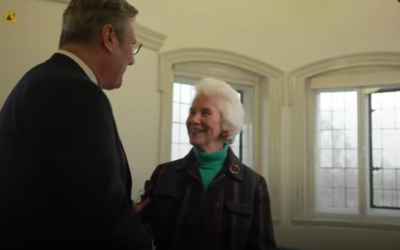
During the exchange, recorded in co-operation with the Holocaust Educational Trust, it emerges that Eva and her mother both only survived the Nazi death camps because the German’s had run out of deadly gas supplies.
Eva was born the day after the supply of gas ended.
Tragically, 15 members of Eva’s family, including her father Bernd Nathan, were not as fortunate.
After meeting Eva, Starmer said :“This Holocaust Memorial Day, we reflect on the untold horrors, pain and suffering of the millions murdered in the Second World War. We remember them, their stories, their families, and their loved ones.
“I recently had the privilege of meeting Eva Clarke BEM, a survivor of the Holocaust who spoke so movingly of her family’s remarkable story. Eva’s mother found strength in the depths of despair, and courage in the face of a horrific reality.
“Her testimony, and that of many others, reminds us that we all have a responsibility to keep their stories alive, learning the lessons from a devastating period of history.
“We must also remember the millions of Jewish people who were unable to tell their stories. May they live in our hearts and minds for years to come, as we collectively pledge to never forget.”
In the film Eva explains how her German Jewish father had escaped from Germany in 1933, moving to Prague, which he thought would be safe.
It was there he met Eva’s mother, Anka Kauderová, where after a “whirlwind romance” they married in May 1940.
But the following summer they were both sent to Terezín, (Theresienstadt), the first camp in Czechoslovakia.
They were to remain there for three years, which was very unusual, but they were young, strong and well able to work.
Starmer says:”Your mother was obviously an extraordinary woman in terms of that whole period.”
Eva responds saying:”Mind you she always said she was a very ordinary women.”
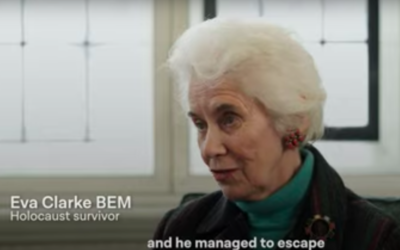
In September 1944, her father was deported to Auschwitz, but “incredibly, my mother volunteered to follow him,” added Eva.
She explains:”She didn’t have a clue where he had gone, because they didn’t know anything about Auschwitz.”
Eva describes her mother as the “eternal optimist” who thought that because they’d survived three years up until then “nothing could get any worse.”
But she never saw him again.
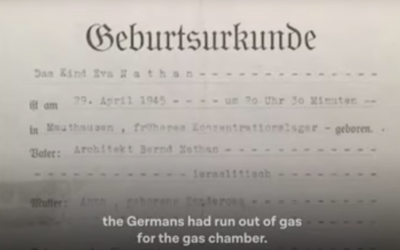
Eva revealed her brother George, born in February 1944, had died of pneumonia two months later.
His tragic death prevented Eva’s mother from being sent to die the Auschwitz-Birkenau death camp.
Eva explained if she had arrived at the camp holding her son “they would have been sent straight to the gas chamber.”
She continued:”But because she arrived in Auschwitz not holding my brother – and although she was pregnant again, this time with me – it didn’t show, and it was very, very early on.”
Her mother remained in Auschwitz “in quotes, from only 10 days,” explains Eva, “but she said it was ten days of sheer hell on earth.”
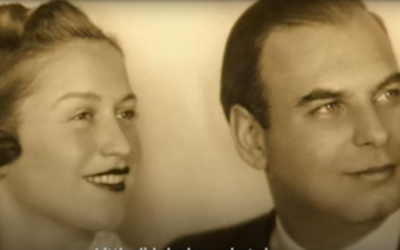
Deemed a strong enough woman, Eva’s mother was sent to a slave labour camp near Dresden, in Germany, where she worked for the next six months.
The German’s recognised her mother was pregnant, but this was after Auschwitz was liberated.
She was then placed on train for a hellish 17 day long journey.
At one stage, with her mother desperate for food, the train stopped to dispose of dead bodies.
Stepping outside a farmer saw the terrible state Eva’s mother was in, offering her a glass of milk.
A Nazi officer went to beat her mother, telling her not to drink the milk. Eva believes it was only the sight of the farmer’s furious face that prevented the Nazi officer from beating her mother.
The train eventually arrived at at Mauthausen concentration camp in Austria, one of the last to be liberated.
Eva then explains:”There are three reasons why we survived, and the first is a very chilling one.
“On April 28, 1945, the Germans had run out of gas for the gas chamber.”
Two days later Hitler committed suicide, and on May 5th the Americans liberated the camp.
Born on April 29th, Eva explains “they reckon I weighed about 3lbs” and without any incubators as there would be now, she was wrapped up in paper to keep warm.
Eva was born on a cart, in the open, without any assistance, medical or any other kind.
By this stage, Anka weighed about 5 stone (35 kg) and she had the appearance of a scarcely living pregnant skeleton.
“The hours, the little things in the end that meant you are your mother survived,” says Starmer.
“The sort of real reminders of all those tragically the other side of the line with the wrong timing.”
Eva replies:”Absolutely.”
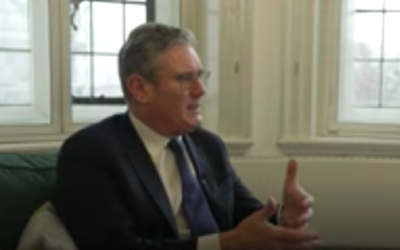
When she was strong enough to travel, Eva’s mother accepted an offer from the Americans to be repatriated in Prague.
“We were put on an ordinary train this time,” says Eva.
But arriving back in Prague, it was only then that Eva’s mother realised “what had probably happened to rest of her family, her parents, her sister, nephew, my three other grandparents, and all the extended family.”
The Labour leader says:”Such a compelling story, we talk about ordinary people, that was something obviously hardwired with your mother.”
Eva, who married an academic lawyer with whom she has two sons, recalls her mother telling her “You don’t know what you can withstand until you are put to the test.”
Eva, who lives in Cambridge, adds her mother told her that despite the nightmare of Nazi rule”I gave her a reason for living.”
The Labour leader describes brave Eva’s account as “remarkable.”

Thank you for helping to make Jewish News the leading source of news and opinion for the UK Jewish community. Today we're asking for your invaluable help to continue putting our community first in everything we do.
For as little as £5 a month you can help sustain the vital work we do in celebrating and standing up for Jewish life in Britain.
Jewish News holds our community together and keeps us connected. Like a synagogue, it’s where people turn to feel part of something bigger. It also proudly shows the rest of Britain the vibrancy and rich culture of modern Jewish life.
You can make a quick and easy one-off or monthly contribution of £5, £10, £20 or any other sum you’re comfortable with.
100% of your donation will help us continue celebrating our community, in all its dynamic diversity...
Engaging
Being a community platform means so much more than producing a newspaper and website. One of our proudest roles is media partnering with our invaluable charities to amplify the outstanding work they do to help us all.
Celebrating
There’s no shortage of oys in the world but Jewish News takes every opportunity to celebrate the joys too, through projects like Night of Heroes, 40 Under 40 and other compelling countdowns that make the community kvell with pride.
Pioneering
In the first collaboration between media outlets from different faiths, Jewish News worked with British Muslim TV and Church Times to produce a list of young activists leading the way on interfaith understanding.
Campaigning
Royal Mail issued a stamp honouring Holocaust hero Sir Nicholas Winton after a Jewish News campaign attracted more than 100,000 backers. Jewish Newsalso produces special editions of the paper highlighting pressing issues including mental health and Holocaust remembrance.
Easy access
In an age when news is readily accessible, Jewish News provides high-quality content free online and offline, removing any financial barriers to connecting people.
Voice of our community to wider society
The Jewish News team regularly appears on TV, radio and on the pages of the national press to comment on stories about the Jewish community. Easy access to the paper on the streets of London also means Jewish News provides an invaluable window into the community for the country at large.
We hope you agree all this is worth preserving.
-
By Brigit Grant
-
By Laurent Vaughan - Senior Associate (Bishop & Sewell Solicitors)
-
By Laurent Vaughan - Senior Associate (Bishop & Sewell Solicitors)
-
By Laurent Vaughan - Senior Associate (Bishop & Sewell Solicitors)
-
By Laurent Vaughan - Senior Associate (Bishop & Sewell Solicitors)





















